#the difference is especially highlighted by c!dream who kind of dresses like shit as much as possible in deliberate contrast with j!dream
Note
I know j!dream uses dresses and that kind of clothes bc of the thing he has with j!sam on the bird house and in one of the good endings were he escape we see him still using them so is it that this was a from of dressing and expression he already had from before all j!sam madness or he find a way to reclaim it as something for himself now?
yeah--the clothing tends to be something he views positively in the birdhouse, honestly. (does conditioning play a part? yes. but a lot of that is um, how do you say,,, self-designed? i guess? wearing pretty clothes by his own volition encourages sam to treat him better which encourages dream to wear more pretty clothing etc.) it's not all dresses/skirts, obviously--j!dream tends to be the one that assumes that j!sam wants him to dress fem more than the other way around (j!sam has wanted this man carnally for two years while wearing a prison jumpsuit in various states of being beat up and/or looking like a drowned rat. kind of safe to say that this man's standards, as long as it's dream, are not particularly high.)--but a lot of the clothing no matter what specific gender presentation is umm somewhat revealing, when he's in the birdhouse
a lot of this from j!dream's pov is about like, power. getting sam to be attracted to him is the greatest power that he has in their dynamic, something he had tried for in the prison and didn't achieve until mayfair. getting sam to stare is something that makes him feel safer. and there's a big part where he's trying to combat how he felt in the prison, alone and in pain and wondering when the hell sam would next come back to make the stupid dispensers stop. he felt abandoned and alone and unwanted and undesirable, by himself at the back of the cell with nothing but sam's torture machine and his own tired, pain-addled thoughts to keep him company. in comparison, the power to make sam stay through his body is another kind of high.
i kind of write j!dream to be a little bit ambivalent about his gender and expression--pre-prison, he would've focused more on practicality and survival, which meant that the way he looked was thrown mostly to the wayside. between the mask and the armor, the main aspects of self-expression boiled down to expressing himself as someone untouchable. in some ways, the big ass closet and its many different outfits and j!duo's whole...thing were the first time he really dressed for practicality of a...different sort, and he does have a measure of fun with it (when sam isn't choosing for him, anyway.)
for him, whether it's during birdhouse or after, he definitely likes feeling attractive and desired by others, whether that be sam or others, and while a big part of that is the super messy cocktail of emotions and conditioning that ends up happening surrounding sex in birdhouse, that stuff also isn't all that easy to untangle just because he's out of that environment, either. with the exception of a few more extreme cases (ff!sam. is a strange man.) j!dream never really internalizes the clothing as something that sam forces on him as much as choices he makes himself to seduce sam into treating him better, if that makes sense, so he'll continue to approach clothing and how he chooses it as ways to shape other people's perceptions of himself for his own safety and survival for,,, a long time.
so yeah, even post-birdhouse he'll still probably dress to look Attractive in a way that didn't matter to him the same way pre-prison, both as a self-comfort (this is something that keeps him safe) and as a means of appeasing other people (in his own head). that being said, there are some changes post-birdhouse in his wardrobe eventually; he'll start dressing more comfortable with time (a lot of his clothing wasn't really designed to be warm, and as such he was quite often pretty chilly in the birdhouse, which sam kept a little on the cooler side), and if he's actually going outdoors more then he'll have to dress a little more practically under armor, etcetera.
#birdhouse AU#mayfair AU#my asks !!#j!dream tends to tailor his clothing to what seems to work best for his situation#to him choosing to wear a dress that makes sam look at him is much better than a drab prison uniform that's forced on him#etc etc whatever#the difference is especially highlighted by c!dream who kind of dresses like shit as much as possible in deliberate contrast with j!dream#and also just gets beat up more because he's never learned to shut up ever
14 notes
·
View notes
Note
Aaaaand one more Q for the evening because I need to retire - if there are any thoughts or tidbits about Hyde/Katuna or Hannah/Luis or Dakota/Frank or Hadassah/Frank or Piotr/Reader that are currently floating your boat, I would love to hear them, if you’re so inclined!! Pls and thank you muchly!
I HAVE SOMETHING FOR ALL OF THEM, OML.
Going under a cut again bc I’m expecting this to get long. Trigger warning for discussion about suicide/self harm.
Hannah/Luis: (This is the one with the trigger warning, FYI.) Okay, so I’ve been thinking about the first time they get into bed together, and I think the set up will look something like this:
They go out to dinner together (on a date, because they’re already romantically involved at this point), and Luis picks up on that Hannah’s not herself; she admits that she’s been in a depressive episode as of late, but says she’s fine with staying out when he offers to take her back to her apartment because: A.) her therapist says she needs to not work on isolating herself, B.) if she’s going to be out, she’d rather be with Luis because he makes her happy, C.) she genuinely enjoys listening to him tell stories.
When they’re back at the car (post-dinner), Luis asks if Hannah’s depression ever makes her feel like hurting or killing herself (bc he’s worried about her, not bc he’s nosy). She says yes, admits that why she wears long sleeves all the time, then starts to roll up her sleeves to show him her scars. He stops her and says she doesn’t have to; she smiles and says she’s okay with it.
Luis kisses her scars. Just saying.
Luis drops her off at her apartment building, and is about to head back to his place when he spies a flower shop.
He gets her some daffodils, then asks to be buzzed in and tells her he “has something for her.” Hannah buzzes him in, he heads up, and gives her the daffodils when she opens the door, citing “yellow is a happy color and might help perk you up” (along with an entire ramble about how it’s okay if she doesn’t perk up, because different things work for different people, and everyone’s brains are different which is so cool, but that he thought of her when he saw the flowers and thought she might like them).
Hannah cuts him off with a kiss on the cheek, says he’s sweet, and invites him in for a cup of tea. They drink tea and talk, then Hannah winds up kissing him while crawling into his lap, and then I think you can see where it goes from there.
Hadassah/Frank: Okay, these two are my angsty couple. They’ve both gone through a ton of shit, they’re both kind of broken inside, and UNGH the angst comes so easily with them. Case in point:
I was working on developing the growth of their relationship, trying to figure out how they wind up having feelings for each other, and it occurred to me that they’d probably fight a lot.
Aside from being stubborn jackasses, Hadassah and Frank both have very different points of view on life, despite being very similar in a lot of ways.
Case in point: Frank burned down his family’s home and everything left in it at the end of DD S2. Hadassah basically sees this as insanity and an act of cowardice, partially because she thinks Frank is running from his own self-perceived failures, and also because having grown up Jewish, she knows all too well that you don’t just destroy things that belonged to people and constitute part of their memories, no matter how painful it is to look at any of it.
They wind up having an ugly fight about it because neither of them can see eye to eye --and also because Hadassah is very willing to get downright nasty about things when she thinks she’s right.
They also fight about when it’s acceptable to kill people. They both think that some people have to be taken out, but Hadassah’s also willing to put down arguable innocents to “keep their six clear” or women and children (think the “Black Sky” and Hand fighters from Daredevil) because an enemy is an enemy is an enemy.
She also thinks that Frank’s “metric” is just his way of trying to absolve himself from his own past with his unit, because black and white seldom truly exists with villains. There’s always family, or a kid that joined a gang to try and make ends meet, and at the end of it, Frank’s probably killing as many “innocents” as she does.
That’s another nasty fight where they wind up not speaking to each other for a bit (which is awkward, considering they’re both staying in the same place).
They do learn how handle each other, eventually. Frank concedes that Hadassah’s tactics keep them safer than his do, and Hadassah acknowledges that you can’t keep an entire trove of stuff when you’re on the run, especially since it makes you easier to identify if someone breaks into your place.
Dakota/Frank: Okay, fun fact: the sex-related dreams Frank has about Dakota act as the story’s tell for how he views her, and how those views are changing. Let me explain:
This idea came from the fact that I have lots of weird (sometimes sexual) dreams because of my meds. I figured since Frank’s been shot in the head and knocked around a bit, he’d be a good candidate for weird dreams, too.
Case in point, the first sex dream he has of her is after watching a match and interview with the rest of Curtis’s group. She plays the cocky brat for TV, and his dream about her is him basically fucking her into the mat and dominating her because her arrogance/behavior annoys him.
As he gets to know her better and realizes that her tics are for the cameras and act as armor, the sex dreams he (rarely) has about her morph away from hardcore, domination focused stuff and towards more equal, love making stuff.
I don’t know how to end this, bc that’s basically the whole thought.
LLAMAS.
Katuna and Hyde: Ah, my sweet babies. My sweet, sweet dorks.
Katuna and Hyde get married at the end of their story. It’s a small ceremony, just with friends and family, but they’re okay with that.
Katuna’s daughter (who is a master seamstress) makes her wedding dress.
Not wedding related, but Katuna and Hyde snuggle a lot. Katuna’s favorite move is to lay her head in Hyde’s lap and have him play with her hair.
They also do a lot of napping together. It starts with them just sleeping on their sides of the bed (before they’re an extremely close couple), but eventually Katuna just takes to nestling right up next to Hyde.
Piotr/Reader: Okay, not exactly what you asked for, but I wanna talk about some things I have planned for the CHC:
Four AU specials for when we hit the end of the series! There’ll be a Zombie Apocalypse one, a loosely based on Beauty and Beast one, a 3+1 (or however many I decide on) Soulmate one, and a Coffee Shop one!
We’re gonna do an Infinity War fic that’s basically gonna be nothing but highlighting powerful woman, and I for one am Pumped about it.
Children of the Gods. OKAY, this miniseries is my BABY for the CHC. I have been working on and perfecting this arc for almost a year. It’ll be a four parter, brings in Karen Page and Frank Castle, Greek mythology, Alexandra’s assassin past and Mafia connections, and UGH. It’s gonna be so good, guys, you have NO idea.
Two kidnapping fics that directly impact the Reader, one of which will be the closest I’ll get to writing horror.
The Wedding/Engagement minseries, which we are V Close to.
At least two more smut fics.
Yeah, lots of exciting stuff! Obvs, I didn’t go into too much detail because this post would literally be a mile long, and also because I do want there to be some surprises, but if you want to know more feel free to ask!
4 notes
·
View notes
Text
Genderbending Robin Hood Adventure Marian Flies True
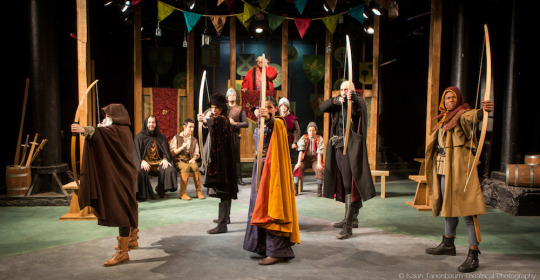
While Robin Hood tales have run the gamut from swashbuckling adventure to serious romantic drama to winking parody to dancing foxes, a few constants remain as true as Robin’s shaft-splitting arrow: Robin Hood, master of both archery and disguise, leads his band of Merry Men to rob from the rich and give to the poor. But what if the real treasure that Robin loots from the privileged (that is, men) is opportunity and agency for everyone else (women and gender-nonconforming people)?
Oh, and Robin Hood was Maid Marian the entire time. It’s the kind of delightful twist that could have been the climax of another tale, but playwright Adam Szymkowicz makes it nearly the opening line of Marian, or the True Tale of Robin Hood. And suddenly, just like the anthropomorphic residents of Disney’s Sherwood Forest or the bellowing refrains of “Men in Tights” from Mel Brooks, a new lens is put into place, through which to reevaluate the familiar trappings of this archetypal tale.
Not that Flux Theatre Ensemble’s charming production disregards those familiar trappings: Will Lowry’s set places the audience in the middle of the action as if they had wandered into a Renaissance faire or made a reservation at Medieval Times; the pennants extending into the intimate seating at the New Ohio Theatre has a positively transporting effect. With Lowry having set the stage, Kelly O’Donnell’s excellent direction populates it with the players, their revolving door of entrances and exits the stuff of French farce.
Truth be told, the Robin Hood story is pretty formulaic: rob from the rich and give to the poor, win the archery contest, free the girl, humiliate Prince John. However, Marian brings new dimension to these beats: When lady archer Alanna Dale (Jessica Angleskahn) discovers Robin’s (Becky Byers) true identity as Marian, the rogue invites the lady to stuff her hair under a hat, dress in men’s clothes, and join the Merry Men hiding out in Sherwood Forest… where she promptly falls in love with Will Scarlett (T. Thompson) somewhere between their first sparring and first sentry shift.
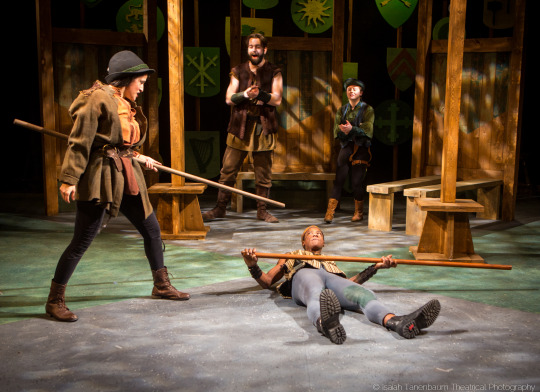
Alanna’s initiation into the Merry Men is the tipping point to reveal that most of the Merry Men aren’t actually men, and that there are more than a few arrow-crossed lovers in the ranks. Maid Marian’s capture later in the play is almost secondary to all of the romantic dramas and identity conflicts unfolding; even the guards have affairs! With all of these secretive trysts and constant donning and doffing of disguises, Marian is less Robin Hood retelling than medieval sex farce, with couples snatching brief tête-à-têtes, on constant alert for a guard or Prince John or another Merry Man to walk in on them.
Which is not to say that makeouts are the only action: Marian boasts a number of balletic fight scenes (choreographed by Rocío Mendez) that highlight the bulk or grace of the respective fighters. In addition to these personal touches, there are some truly creative choices with regard to perspective, especially one sequence that involves scaling the castle wall. And I gasped every time an arrow came out of nowhere—that little detail really made me feel as if I were in a Robin Hood adventure.
An amusing aspect that this version retains is the famous romance between Robin and Marian, made even more hilarious by the fact that this “power couple” can never actually be seen in the same room together. Now that’s the kind of Noises Off shenanigans it would have been great to see. Though it’s worth pointing out that the double-casting of Mike Mihm as both Friar Tuck and the Sheriff of Nottingham achieves some of that winking humor: Both are lovers to lady-in-waiting Shirley (Nandita Shenoy), though it’s clear that she’s more smitten with the good Friar. The latter’s pillow talk is one of the play’s surprisingly deep moments, as they discuss the relative sinfulness of greed when it’s not coveting someone else’s possessions but simply wanting better for your own life.
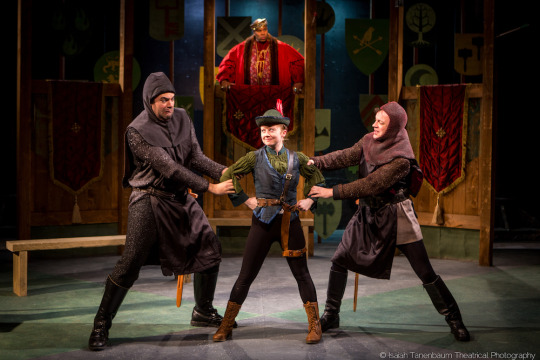
It’s the kind of existential dilemma that Marian could weigh in on, but strangely, we never find out the why behind this genderbending plot twist: Did Marian dream up the Robin Hood persona, or was it bequeathed upon her, à la the Dread Pirate Roberts? How does she account for feminine inconveniences such as her period or the need for hair upkeep? Surely the Merry Men would notice if there were soiled sanitary napkins piling up around camp every month, or extra hairpins and chest bindings lying around. Did she decide to lead a double life because of shortcomings in her life as Marian; if so, why live half of her time as a noblewoman courting Prince John’s affections? Access, most likely, though we only get to see the tail end of one heist that she’s masterminded.
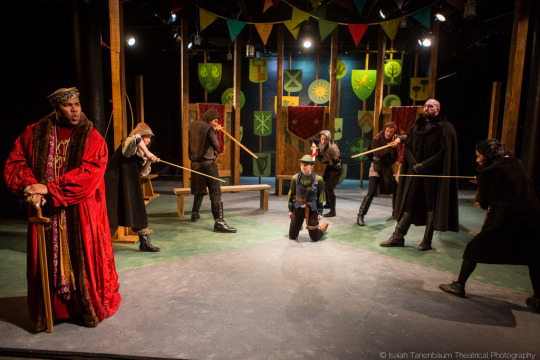
Perhaps my favorite facet of Marian’s character is her reverse-psychology utilization of “feminine wiles”: Whenever Prince John starts getting too handsy, she starts sweetly talking about her period, which has him twisting in revulsion even before she’s gotten into the nitty-gritty. All she has to do is remind this germaphobe prince about the not-so-fun parts of her genitals, and he’s lost any boner. As Prince John, Kevin R. Free is an absolute delight. Yes, he embodies the bumbling ruler through campy sashays and ridiculous cooing to a fake carrier pigeon. But for every shrill order there’s the converse, as he shifts into menacing by dropping an octave and pulling himself up to his full height, reminding you—oh shit, this is the man in charge, we’re in trouble.
Our own lack of access to Marian is somewhat mollified by Alanna frequently stepping outside of the narrative to deliver a running commentary on the action—a framing device that I found at times charming (“I don’t know this yet”) and other times excessive (considering the frequency with which she interrupted the action). As we’ve just learned that Robin isn’t who we thought he was, taking another step away from the archetypal character naturally loses some of the intimacy I was craving. Yet at the same time, it’s wonderful to see that Marian is the rule rather than the exception, to meet other women who possess the same pluck and spine. But Alanna is no mere audience insert; as a(nother!) slyly genderbent take on the minstrel Alan-a-Dale, who pops up in many a classic Robin Hood tale, she ably fulfills the duties of her predecessor.
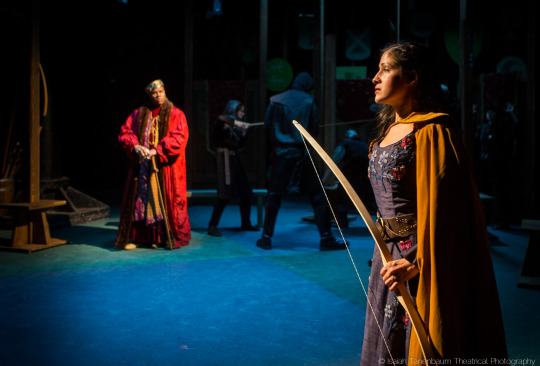
Further, Alanna’s perspective—bookending moments with “This is my [concerned/in love/etc.] face”—taps into one of the play’s central themes: the duality of self. Prince John allows no one but concubines access to him in his most private moments. Shirley has the same “define the relationship” conversation with both of her paramours, down to the word, but the inflection couldn’t be more different. Just as he hides his sensitivity with brashness, Will Scarlett has a very specific persona he wants the world to see, genitals be damned. Little John (played to perfect sweet dumbness by Jack Horton Gilbert) reconciles his crush on Marian with his love and loyalty for his best friend Robin. Alanna knows that the face she turns toward the world is not reflective of what’s going on inside her head.
It’s a credit to Szymkowicz that Marian isn’t the only character struggling with two selves, but Becky Byers embodies that push-and-pull with aplomb. I’ve seen her age ten years in a day (in Mac Rogers’ The Honeycomb Trilogy), so I was delighted by the perfect casting. Though her chipper Robin, dressed in all green, sometimes leans more Peter Pan, further consideration has made me realize that it’s just a new take on the famous Robin Hood aloofness that makes him so inspiring but also so frustrating. Even when he’s giving so much in terms of riches, he gives away little of himself. Unfortunately, Marian is drawn less clearly; she invokes the same cheery deflection with Prince John, but we know little of her private self… except for one telling line, in a moment of somber self-analysis: “Some of us have to have less so all of us can have more.”
What Marian lacks in nuance, she makes up for as Robin Hood the figurehead, granting permission to everyone else to express their truest desires. The casting of mostly female and trans actors in the Merry Men brings to mind Jaclyn Backhaus’ Men On Boats, but in this case, the play explicitly addresses the queering of traditional notions of gender. The most touching example is that of Much the Miller’s Son (C. Bain), who confesses to the rest of the Merry Men that they don’t feel much like a man—or a woman, for that matter. They request that the name of the group be adjusted to account for not just cisgender men or women in drag (though, hilariously, no one actually knows about the women in their midst), and though no one actually understands why Much made this request, they don’t deny it. Bain’s part is small, but he imbues it with such gravity and earnestness that Much’s desires become intensely relatable.

With a 90-minute running time, Marian both moves too quickly in parts and drags in others, as the story seems designed to fit the timing instead of the other way around. We cover so much ground, with an ending that felt far too rushed in its attempts to both achieve closure but keep the myth going, that the overall effect of this particular story is lessened. In truth, Marian would make an amazing pilot of sorts, the first volume in an ongoing saga. I would love to see it live on as an ongoing series, like The Brick’s monthly soap opera It’s Getting Tired, Mildred or The Flea’s weekly #serials. That way, we could take on the role of Robin Hood’s audience night after night and week after week—right where he wants us.
Marian, or the True Tale of Robin Hood runs through Saturday, February 11 at the New Ohio Theatre. Click here to purchase a Living Ticket!
1 note
·
View note